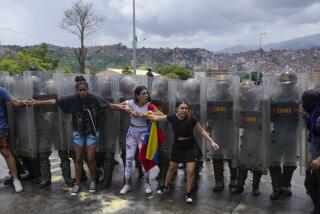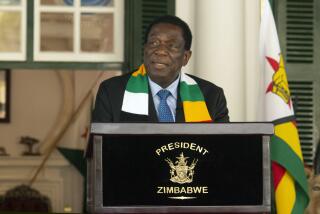Shiite Alliance Is Confident of Win as Vote Count Continues
- Share via
BAGHDAD — As the vote count continued in last week’s parliamentary elections, leaders of Iraq’s religious Shiite Muslim coalition expressed confidence Saturday that they would prove victorious. But more complaints of electoral violations emerged throughout the country’s Shiite-dominated south.
Election officials said it would take several more days to release preliminary results. The uncertainty didn’t stop leaders of the United Iraqi Alliance from predicting a dominating electoral performance similar to the one in January’s vote for an interim national parliament.
“I bless this victory for the alliance list,” said outgoing Prime Minister Ibrahim Jafari during a visit to the Shiite holy city of Najaf.
Assuming the part of a magnanimous winner, Jafari hailed the participation of minority Sunni Arab voters who had largely shunned the January vote. He called for all of Iraq’s religious and ethnic groups to “stand below the roof of the new parliament to build a new Iraq.”
The guessing game over how each electoral slate performed is likely to continue dominating public debate as Iraqis await final results, which the electoral commission estimates could take up to two weeks.
Commission officials have tried to counsel patience.
“Some political entities will say, ‘We have this many votes,’ but this is not correct. They cannot guess,” said commission member Farid Ayar.
“It’s important to stay off the air saying, ‘We won this or we won that,’ ” said a Western diplomat in Baghdad. “That’s not acceptable diplomatic practice. That’s pressure.”
In the meantime, speculation has begun over the makeup of the government that will rule Iraq for the next four years. After the January vote, the United Iraqi Alliance partnered with an ethnic Kurdish coalition to form the interim government. Former interim Prime Minister Iyad Allawi, whose slate won 40 seats in the 275-member interim National Assembly, was frozen out.
This time, a newly engaged Sunni population could have an effect on the political dynamics. Leaders of the top Sunni slate, headed by the Iraqi Islamic Party, predict Sunnis may win anywhere from 40 to 50 seats. Iyad Samarrai, a senior party official, said he was open to the possibility of joining the religious Shiite alliance in a coalition government.
The postelection period could also bring a raft of internal power struggles among Shiites, Sunni Arabs and Kurds. Jafari was regarded by many within his own coalition as a caretaker prime minister for an interim government. Among his likely challengers this time is current Vice President Adel Abdul Mehdi, a fellow religious Shiite.
Observers in Kurdistan, a largely autonomous region of Iraq, also predict that a move is underway by reformists within Iraqi President Jalal Talabani’s Patriotic Union of Kurdistan party to ease Talabani, a veteran guerrilla leader, into a more symbolic role.
When negotiations over a governing coalition begin in earnest, Allawi, who was appointed to his interim leadership spot while the U.S.-led occupation authority was still in charge of Iraq, may again find himself on the out side.
A secular Shiite, he maintains a viscerally hostile relationship with the United Iraqi Alliance, with whom he waged an often bitter electoral struggle in the Shiite heartland in southern Iraq.
Allawi and his aides have protested what they call a systematic pattern of electoral violations by the alliance, including multiple voting, fake names on voter rolls and intimidation of opposing slates’ campaign workers.
Allawi left Iraq on Saturday amid speculation that he was disillusioned by his slate’s performance.
In a news conference, several top deputies detailed reports of attacks on Allawi campaign workers and voters using chemicals to remove the purple ink from their fingertips so they could vote more than once.
“The violations started right from the beginning of the electoral campaign,” said Hamid Majid Moussa, head of the Iraqi Communist Party and a partner in the Allawi coalition. The Communist Party’s headquarters in the southern city of Nasiriya was attacked on election eve by a mob of alliance supporters, who also set fire to a building housing Allawi’s campaign offices there.
Allawi backers also protested the alliance’s use of religious imagery to imply that the slate had the support of Grand Ayatollah Ali Sistani, the nation’s top Shiite cleric.
“They put his picture on all their posters,” said Safiya Suhail, one of the top female candidates on the Allawi slate.
The electoral commission extended by one day the initial Saturday deadline for official complaints of electoral violations.
Commission head Hussein Hindawi said all formal complaints would be investigated but he did not explain how, or what steps would be taken if violations were found to have significantly affected the voting.
Suhail said the commission had ignored several warnings about illegal tactics. “We have serious reservations about the commission,” she said.
Times staff writers Caesar Ahmed, Suhail Ahmad and Borzou Daragahi in Baghdad contributed to this report.
More to Read
Sign up for Essential California
The most important California stories and recommendations in your inbox every morning.
You may occasionally receive promotional content from the Los Angeles Times.










